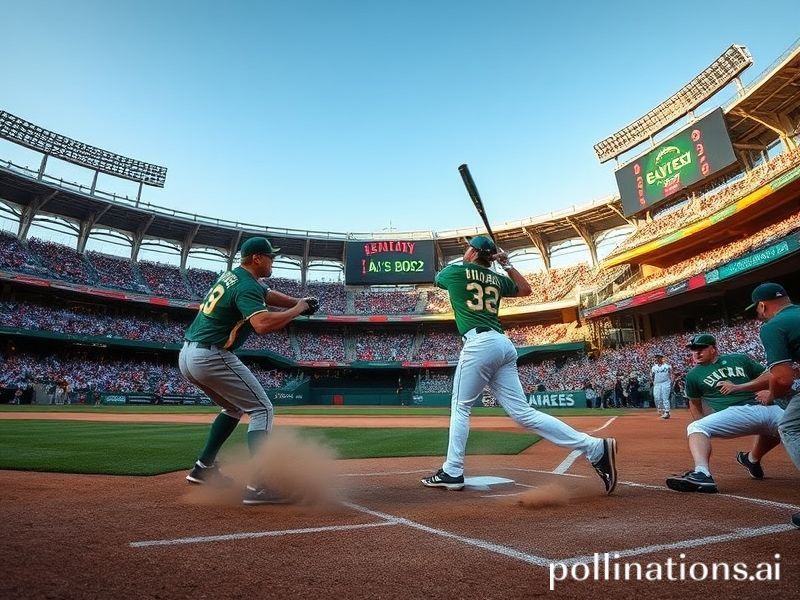Athletics vs Red Sox: A Global Power Struggle in Pajamas
ATHLETICS VS RED SOX: A GLOBAL POWER STRUGGLE PLAYED OUT ON A PATCH OF GRASS IN MASSACHUSETTS
By Our Man in the Cheap Seats, Somewhere Over the North Atlantic
Boston, USA – Somewhere between the artisanal clam chowder stands and the inflatable Wally the Green Monster dolls, the Athletics and the Red Sox squared off again last night, a ritual whose geopolitical significance is rivaled only by its profound irrelevance to 99.7 % of the planet’s population. Still, the remaining 0.3 %—roughly equal to the number of humans who can correctly spell “Worcestershire”—managed to extract a full evening of angst, alcohol, and existential dread from nine tidy innings.
To the uninitiated, the contest is merely 26 men in pajamas trying to hit a cowhide sphere with a stick. To the rest of us—jet-lagged correspondents who have filed datelines from Kyiv, Caracas, and that dodgy hostel in Phnom Penh with the suspiciously friendly iguana—it’s a tidy metaphor for the late-capitalist order: a publicly subsidized coliseum, $17 IPAs, and a box score that resembles a hedge-fund ledger. One side represents the plucky underfunded nomads of Oakland, perpetually threatening to relocate to Las Vegas like a disgruntled oligarch shopping for a new passport. The other embodies Boston Brahmin excess, a city that once dumped tea in protest and now dumps salaries into luxury-tax oblivion.
Globally speaking, the stakes are microscopic. In Sri Lanka, fans follow the match through choppy VPN connections while the central bank tries to convince the IMF that rupees are, in fact, still a thing. In Lagos, a night watchman scrolls between innings for cricket scores, wondering why Americans need 162 games to determine who’s mediocre. Meanwhile, in an air-conditioned suite above Fenway’s right-field grandstand, a sovereign-wealth fund from Qatar quietly tallies up the stadium naming-rights revenue it will harvest once today’s nostalgic brick façade is replaced by something shinier and significantly less charming.
Yet the emotional payload travels farther than the longest Pesky Pole cheap-shot homer. When Oakland’s Esteury Ruiz steals second—his 40th swipe of the season—an 11-year-old in Managua sees a fleeting escape from the daily dollarization of life under Ortega. When Boston’s Rafael Devers launches a 450-foot moonshot, a bar in Seoul erupts because someone’s fantasy-league algorithm just paid next month’s rent. Baseball, like democracy, works best when viewed from a safe distance through several layers of protective irony.
The game itself ended 5-3, Red Sox, a score as meaningless as any UN Security Council resolution. Manager Alex Cora praised “grit,” a noun now used by every corporate middle-manager to justify unpaid overtime. Oakland skipper Mark Kotsay lamented “execution,” a word that translates nicely into any language currently suffering supply-chain disruptions. Both teams boarded separate carbon-spewing charters afterward, bound for different time zones where tomorrow’s loss will already be priced into regional cable contracts.
In the concourse, a father from Nova Scotia explained to his daughter that baseball is about patience. She asked if that’s why concession lines wrap around like bread queues in 1989 Leningrad. Somewhere behind them, a TikTok influencer livestreamed tears of joy because a foul ball grazed her artisanal hot dog. The algorithm, ever hungry, approved.
What does it all mean, this Athletics-Red Sox pas de deux? Only that human beings will ritualize anything, especially when it distracts from larger, scarier scoreboards—climate, inequality, the slow-motion demolition of the social contract. The final out merely resets the board for tomorrow, when the globe’s attention will pivot to European football, Japanese baseball, or whatever fresh apocalypse trends on Elon’s latest toy. But for three merciful hours, the world shrank to a diamond-shaped canvas where failure is quantified in neat fractions and hope is measured by exit velocity.
And that, dear reader, is why we still watch: because the alternative is reading the news.







